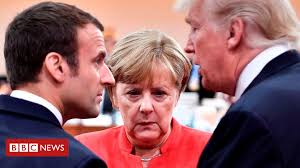
Founders Broadsheet trade correspondent L.C. reports:
President Trump is continuing to pursue his “Stick it to the allies” trade policies in parallel with US-China negotiations, despite signs that these conflicts with allies are undermining US strategic interests in Europe and Asia. The president has turned his back on allies who share his interest in curbing China and Russia and bringing to heel a shaky ally, Germany. One flagrant example of this counterproductive behavior has just come to light.
“President Macron came to the White House last April hoping to join forces with President Trump in confronting China on its trade and business practices. Mr. Macron’s bid for a united front went nowhere…Mr. Trump instead told Mr. Macron he didn’t want to see the European Union reaping the benefits of a U.S.-China trade pact,” today’s Wall Street Journal reports.
“Nearly a year later, Mr. Trump continues to keep European allies at arm’s length, declining to share details of the draft trade agreement [with China] —which he has called ‘my deal’…
“Some U.S. business leaders say Mr. Trump’s unilateral approach doesn’t bode well for a long-term solution.
“‘We should be working hand-in-hand with our allies,’ said Craig Allen, president of the U.S.-China Business Council. ‘This should be an opportunity to collaborate collectively with other industrial nations and if we do not collaborate—it is less likely that any deal reached will be sustained.’”
More recently, EU Trade Commissioner Malmstrom was in Washington, D.C. She met with US Trade Representative Lighthizer on March 6th for the fifth session of the US-EU Executive Working Group on trade. Malmstrom made a strong appeal for US-EU cooperation to revive the global trading system. She stressed the importance of the World Trade Organization (WTO) while agreeing that it needs reform and the need to deal with China’s abuses. She warned that US blocking the appointment of new WTO Appellate Body judges “threatens to break the system altogether.” And she said the Trump administration has to “rebuild trust with the EU” after breaking it with its aggressive unilateral tariffs.
A trade attorney participating in the event called for a different approach. Rather than working to change WTO rules (which requires consensus), he called for the US, EU, and Japan and others to launch a “massive” WTO case against China, targeting all its practices that violate commitments made in its Protocol of Accession – that is, a case against China for violating current obligations. He suggested that WTO rules don’t have to be changed in order to go after China’s trade-distorting behavior.
Angela Merkel’s influence
Getting in quarrels with everyone at once is a good way to ensure that one wins none them, especially the more important ones. The EU had been on the verge of taking away from German Chancellor Angela Merkel the decision power as to whether the Nord Stream 2 natural gas pipeline from Russia gets built. Both the US and security-minded Europeans have been opposing the project because of how dependent it will make Germany on Russia for its energy. Germany is already the weak link in NATO, seething with anti-Americanism that Merkel reinforces, and refusing to heed the US in not installing China’s Huawei telecom equipment out of security concerns.
France’s President Macron was a key figure advocating EU control over and scuttling of the NordStream 2 project, but Merkel got him to back off and leave the decision to her, so she could go ahead with the Putin-promoted deal. President Trump’s slap in the face to Macron’s bid for US-EU unity cannot have encouraged the French president to continue his opposition to the German leader.
India too
The Trump administration is also skirmishing with another key strategic player, India. US Trade Representative Lighthizer recently stated “that the US intends to terminate India’s and Turkey’s designations as GSP beneficiary developing countries… because they no longer comply with the statutory eligibility criteria.” Some analysts note that the pain will be felt the hardest by US small businesses. Indian officials point out that the majority of its GSP-covered exports are intermediate or semi-finished products used by US manufacturers. The Indians also note that these products are largely labor-intensive and thus the loss of GSP status will cause a loss of jobs in India.
Indian officials have long expressed frustration that the Trump administration focuses on narrow goals such as trimming the trade imbalance and helping specific industries rather than on efforts to strengthen the broader economic and strategic relationship. Moreover, bilateral trade has boomed over the past year, rising 16.7%, with US exports growing by at least 27%.
While the amount of money and trade involved for India is fairly small, Prime Minister Narendra Modi is facing an increasingly difficult national election next month, and this move will be seen as a blow to the warm relationship he has cultivated with Washington. India occupies a critical role in efforts by the US to prevent China from dominating southern Asia and the Indian and Arabian seas.
China talks stalled
Not surprisingly, the Trump administration’s go-it-alone trade talks with China have stalled. While progress has been made in some areas, the issue of enforcement has not been settled, nor China’s commitment to meaningful structural changes. A deal isn’t likely in the immediate future and the previously anticipated late-March Trump-Xi summit at Mar-a-Lago is unlikely to occur.

Leave a Reply